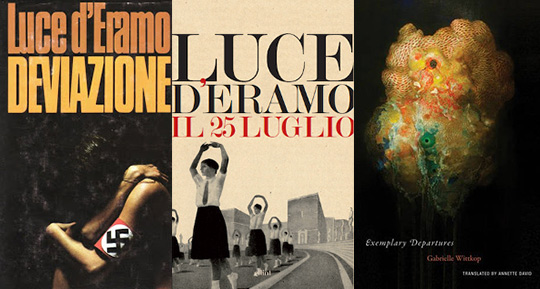Having managed to sidestep Ferrante’s Neapolitan novels all year, I did, however, enjoy two Italian writers greatly.
In the early 1950s, the Italian Luce D’Eramo (1925- 2001) wrote a series of unusual short stories that were first published in journals by the likes of Alberto Moravia and later collected under the evocative if rather literal title of Racconti Quasi di Guerra [Almost Stories of War]. In the first of these she published, ‘Idilli’, we hear the alternating accounts of a young couple living a precarious life as casual labourers on the outskirts of a war-torn city, in a style shorn of every embellishment but nonetheless poetic in its sparseness. Another, ‘Straniera’, is the first-person narrative of a migrant worker in Nazi Germany. We see her strategies of survival: forging medical letters, exchanging contraband cigarettes for bread, and stealing books from burning libraries, until she (nearly) gets caught for defaming the Reich. In the now iconic ‘Il 25 luglio’, the young narrator discovers that Mussolini has been arrested and fascism has fallen.
These, and other stories from her entire career, have now been collected in Tutti I racconti (2014); I’m working my way through the later ones now, and am surprised that d’Eramo, who is probably best known for her novel Deviazione, a devastating account of the narrator’s adolescent infatuation—and subsequent disillusion—with Nazism, hasn’t yet been translated into English, and I hope that someone will soon translate at least one story from this collection for Asymptote.
The fiction of Alessandro Spina (1927-2013), another well-kept Italian secret, has, however, appeared in a fine translation, The Confines of the Shadow (Blaft), this year. I’ve been looking forward to reading Spina since my friend, the poet and translator Andre Naffis-Sahely, enthused about his Libyan sequence of novels in the courtyard of the British Museum just over two years ago. Now, in a volume that includes two novels and a story, in which the lives of Levantines (Benghazi-born, Spina himself was of Maronite origin) intertwine with those of Italian colonisers and marginalised locals in 20th century Libya, this multi-part oeuvre becomes available to Anglophone readers.
Gabrielle Wittkop (1920-2002) has a cult readership for her novella, Necrophiliac, but Exemplary Departures (Wakefield Press), released October this year, shows an entirely different facet of her talent: five novellas or tales about deaths in unusual circumstances, including those of Edgar Allan Poe and Idilia Dubb. (Translator Annette David points out that Wittkop wasn’t drawn to the experimentalist technique of her contemporary nouveau romanciers, but looked back to an earlier legacy of French literature of decadence for inspiration. There’s also more than a passing resemblance to Angela Carter.) The most harrowing of these fictions is ‘Baltimore Nights’, in which an alcoholic writer dies in the gutters of the eponymous city, while the most extravagant are ‘Mr T’s Last Secrets’, which follows its spy-hero around various South East Asian locales, and ‘Claude and Hippolyte’, which details the sexual and other predations of its androgynous twin protagonists with Wittkop’s characteristic and unusual flair.
Aamer Hussein is a contributing editor at Asymptote. He was born in Karachi in 1955 and has lived in London since the 1970s. A graduate of SOAS, he has been publishing fiction and criticism since the mid-1980s. His several works of fiction include the collections This Other Salt (1999), Insomnia (2007), and two novels, Another Gulmohar Tree (2009) and The Cloud Messenger (2011). He has edited an anthology of writing from Pakistan, called Kahani (2005). He also regularly publishes fiction and essays in Urdu, his mother tongue. His most recent book of stories, 37 Bridges, was published in India by HarperCollins earlier this year.

